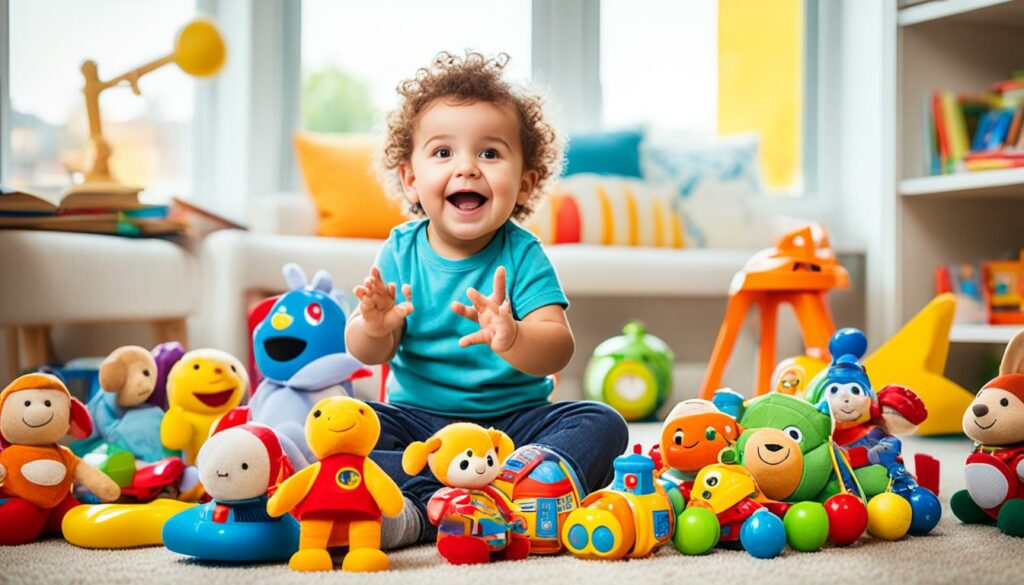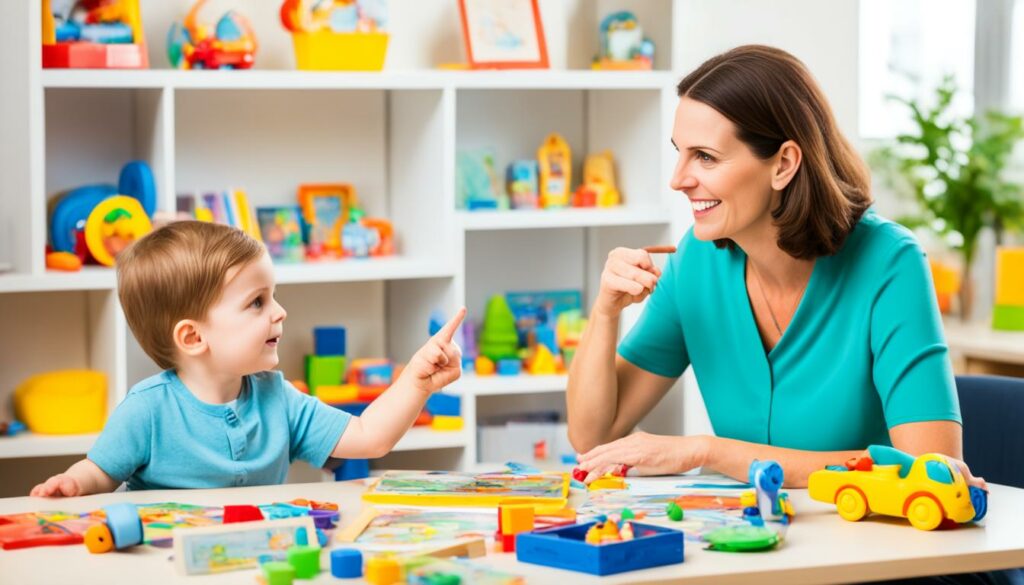Child Language Development is an intriguing and intricate journey. From birth, babies start assimilating the sounds, rhythm, and intonation of the language in their environment. They naturally react to their caregivers’ voices, building the groundwork for their own language abilities through these exchanges. As a parent, you have a vital role in fostering your child’s language growth and preparing them for triumph in communication and education.
Imagine this: it’s a beautiful morning, and you’re sitting in the park with your one-year-old daughter, Sophia. The sun is shining, birds are chirping, and you watch as she explores her surroundings with wide-eyed curiosity. As she reaches out to touch a flower, you gently say, “Look, Sophia, that’s a pretty flower! Can you say ‘flower’?” She looks up at you, her eyes sparkling, and utters her first word, “F-f-flower!” You can’t help but feel a surge of joy and pride as you witness this magical milestone in her language development.
Research shows that infants and young children’s early exposure to language helps lay the groundwork for later reading and communication skills. By the time children are five years old, most have acquired all the skills needed for oral language development1. But how does this language development happen?
It starts with the simple act of talking to your child. Every word, every conversation, every moment spent engaging with your child is an opportunity for language learning. Infants and young children perceive pictures in books as having their own oral tale before understanding words’ sequential comprehension in stories1. So, when you read to your child, you’re not just sharing a story, you’re building their language skills and fostering a positive association with reading.
Language development is not limited to spoken words. Cultivating phonological awareness through auditory and visual word games helps children develop their language skills1. Playing rhyming games, singing songs, and exploring different sounds together can be both fun and beneficial for their language development.
But language development goes beyond just words. Children learn one-to-one correspondences, patterns, and sequences as foundational concepts before connecting them to math and reading1. By engaging in activities that stimulate their imagination and creativity, such as imaginative play and storytelling, you can help your child develop a rich and diverse language repertoire.
It’s important to remember that language development is a journey unique to each child. Some children might find talking and listening harder than others, struggling to understand words and sentences or find the right words and sounds to use2. If you have concerns about your child’s language development, seeking further assistance from a speech and language therapist, health visitor, or GP can be helpful2.
Key Takeaways:
- By the time children are five years old, most have acquired all the skills needed for oral language development.
- Early exposure to language helps in the groundwork for later reading skills.
- Children’s emergent literacy involves perceiving pictures in books as having their own oral tale before understanding words’ sequential comprehension in stories.
- Early language interaction and skills acquisition are crucial for brain development, especially related to later learning skills like math and logic.
- Parents spending quality time engaging in activities like talking, reading, and playing with their children can nurture early language development.
The Importance of Early Language Interaction
Infants and young children begin to make connections between words and the things they represent through language interaction with parents and caregivers. This early language development is crucial for their overall speech and language development as well as reaching important language milestones in kids.
When adults respond promptly and enthusiastically to a child’s message, it encourages their language development3. By providing fun and interesting interactions, children’s engagement and communication opportunities increase, which are important for effective language learning3. Conversations in everyday situations play a major role in children’s language acquisition3. Being able to actively participate in interactions with caring adults is significant for their language development.
Listening to language is vital for the development of reading skills. In the early stages of emergent literacy, children understand that words tell the story illustrated by the pictures in a book3. This early exposure to language and the ability to make connections between words and their meanings helps lay the foundation for future language skills, abstract thinking, and overall brain development.
Early language interaction and skills acquisition play a critical role in nurturing a child’s language development. By providing a language-rich environment and engaging in meaningful interactions, parents and caregivers can help their children reach important language milestones in their development.
Nurturing Language Development Through Communication
As a parent, you have a crucial role in fostering your child’s language development through communication.1 Simply talking to your child on a regular basis, even during daily activities like driving in the car or cooking, can have a significant impact. Engage your child in conversation, asking questions, and actively listening to their responses. This not only strengthens their communication skills but also builds their vocabulary and understanding of language.
Reading to your child is another powerful way to promote language development.1 Make it a habit to read aloud to your child every day, choosing age-appropriate books that capture their interest. Encourage interactive reading experiences by discussing the pictures, asking questions about the story, and encouraging your child to make predictions. These interactions help expand their language skills, enhance their vocabulary, and foster a positive association with reading.
Phonological awareness is a crucial aspect of language development, and you can cultivate it through various activities.1 Engage your child in rhyming games, where they can identify words that sound alike. Encourage word breaking exercises, where they can segment the sounds in a word. Word matching activities, where they can identify words with similar sounds or patterns, also support their phonological awareness. These activities not only foster language development but also lay the foundation for reading and spelling skills.
To further enhance your child’s language skills, promote one-to-one correspondences and counting concepts.1 Point out numbers and count objects together, reinforcing the connection between spoken numbers and quantities. Engage your child in activities that involve patterns and sequences, such as completing puzzles or playing with building blocks. By making these connections, children learn to associate numbers and letters with math and reading, further supporting their overall language development.
Positive early reading experiences and exposure to a print-rich environment are crucial for fostering a love for books and supporting learning to read.1 Set aside dedicated time for lap reading, where you cuddle up with your child and read together. Surround your child with a variety of age-appropriate books, ensuring that they have easy access to reading materials. Creating a print-rich environment with labels, signs, and other written materials further immerses your child in literacy and supports their language development.
By nurturing your child’s language development through communication, reading, and engaging in language-based activities, you are setting the stage for their future success.1 Remember, quality time spent interacting with your child is crucial for their language development. Take advantage of every opportunity to talk, read, and play together, and watch as their communication skills flourish.

| Age Group | Developmental Milestones |
|---|---|
| 3-12 months | Start to coo, smile, and laugh.4 |
| 1-2 years | Utter first words and comprehend their meaning.4 |
| 2-3 years | Combine two words into short sentences.4 |
| 3-5 years | Speak in sentences of three or more words.4 |
| 5-8 years | Have conversations similar to adults.4 |
Encouraging Language Development Through Creative Play
Engaging in creative play is not only a fun and enjoyable activity for toddlers and young children, but it also serves as a valuable opportunity to encourage language development. Through various forms of play, children can expand their vocabulary, improve their ability to put together phrases and sentences, and reach important language milestones.
Dramatic play is one form of creative play that can greatly contribute to language skills in toddlers and young children. By creating storylines, characters, and emotions, children immerse themselves in a world of imagination and self-expression. This type of play encourages them to use new words, phrases, and sentences as they engage in dialogue and interact with others. Thus, dramatic play not only enhances their language skills but also promotes their social and emotional development.56
An effective way to nurture language development is by narrating daily activities and describing what your child is doing. By turning simple words into phrases and eventually sentences, children can strengthen their understanding and use of language. For example, you can describe the steps of a game or explain the actions your child is taking during playtime. This practice provides children with valuable language input and helps them develop their expressive language skills.5
In addition to hands-on play experiences, it is crucial to create a print-rich home environment. Surrounding your child with books, audiotapes, and videos fosters a love for reading and exposes them to a variety of language patterns, vocabulary, and storytelling styles. Reading together with your child not only promotes bonding but also facilitates language development through exposure to new words, sentence structures, and concepts. This interactive experience sets a strong foundation for their literacy development and enhances their overall language abilities.56

Through creative play, children have the opportunity to explore and experiment with language in a meaningful and engaging way. Encouraging their language development through activities such as dramatic play, narrating daily activities, and providing a print-rich environment can have a significant impact on their language skills and milestones. By fostering their language skills in a fun and interactive manner, parents and caregivers play a vital role in supporting their overall communication abilities and setting them up for future success.56
Supporting Language Development in Preschoolers
Preschool age marks an important period for supporting your child’s language and communication skills. During this stage, various strategies can be employed to foster their language development and nurture their growing abilities.
Encouraging pretend play is a powerful tool for enhancing language skills in preschoolers. Through creating storylines, characters, and emotions, children can expand their vocabulary and develop their language abilities. This imaginative play allows them to express themselves freely and practice using words in different contexts.
Asking open-ended questions can also facilitate conversation and encourage children to elaborate on their thoughts and ideas. Instead of simple yes or no answers, encourage your child to provide explanations. This helps them develop more complex language skills and articulate their thoughts more effectively.
It is important to note that providing correction or criticism immediately can have a negative impact on a child’s language development. Instead, repeat their sentences back to them using the correct language and provide a positive learning experience. By modeling the correct usage, they can learn from your example without feeling discouraged or criticized.
Research has shown that preschool language development plays a critical role in a child’s overall educational outcomes. Early vocabulary has been identified as a predictor of future reading comprehension and decoding skills. Language development also supports cognitive advancement and helps children form meaningful friendships7.
By supporting your child’s language development during the preschool years, you are laying a strong foundation for their future communication milestones and academic success.
Language Development in School-Aged Children
As children transition into school-aged years, supporting their language and communication skills takes on a new form. One effective way is through engaging in imaginative play, where children create their own storylines, characters, and emotions. This type of play not only enhances their vocabulary but also encourages them to express themselves through language and promotes communication skills in children.8
Another strategy is to ask open-ended questions that leave room for explanation and elaboration. These types of questions stimulate conversation and give children the opportunity to practice their speech. Instead of just asking simple yes or no questions, try to engage in meaningful dialogue by commenting on what your child says and asking further questions.8
It’s important to create a positive environment that encourages conversation and makes children feel comfortable speaking. Rather than being critical, correct their language in a non-judgmental way. Repeat their sentence back with the corrected language to provide a positive learning experience and foster their language development.8

Children at this age are capable of understanding and using compound sentences with words like ‘and’ or ‘but’ to join sentences together. They are also naturally drawn to reading, with many of them reading on their own, writing simple stories, and comprehending what they read. Reading becomes a favorite activity for many school-aged children, supporting their language and literacy skills.9
From the age of 5, children can follow multi-step directions, demonstrating their growing language comprehension and cognitive abilities. Additionally, their storytelling skills continue to improve significantly, as they create longer, more detailed stories with well-developed plots and a logical order of events.9
Growing up in a bilingual or multilingual family can also have a positive impact on a child’s language development. Research shows that these children can speak and use English as well as their monolingual peers by the middle of primary school, highlighting the benefits of language exposure at an early age.9
However, it’s important to be aware of potential speech difficulties. If by the age of 6, a child is difficult to understand or isn’t speaking in full sentences, or at 8 years, a child has a stutter or lisp when talking, seeking professional help is recommended, including possibly being referred to a speech pathologist.9
The Role of Everyday Interactions in Language Development
Everyday interactions play a significant role in supporting language development in children. Talking to your child and listening to them attentively is essential. Putting aside distractions and getting eye level with your child when they want to communicate encourages their language practice.
Providing multi-sensory input, such as allowing them to see, smell, touch, and taste objects while labeling them, enhances their associations and vocabulary. Talking about the here and now, and asking open-ended questions instead of close-ended ones, also helps expand their language skills.
“Researchers found that increased neural activity in response to social interaction at 5 months predicted enhanced language development at later ages: 18, 21, 24, 27, and 30 months”10.
By engaging in meaningful conversations and providing a rich linguistic environment, you are actively promoting your child’s language development. These everyday interactions not only build their vocabulary and comprehension skills but also foster a love for language and learning.
| Language Development Strategies |
|---|
| 1. Talk to your child and listen attentively |
| 2. Provide multi-sensory input to enhance associations and vocabulary |
| 3. Ask open-ended questions to encourage conversation |
Remember, every interaction is an opportunity to nurture your child’s language skills and create a strong foundation for their future success.

The Power of Reading in Language Development
Reading to your child, regardless of their age, is a powerful tool for language development. It not only creates a bonding experience but also has numerous benefits for their language skills. By regularly exposing your child to books, you provide them with opportunities for letter and word recognition, expand their vocabulary, and ignite their imagination. When you read with your child, you expose them to new words and descriptions that may not commonly come up in daily conversations. This exposure fosters their language learning by introducing them to a broader range of concepts and ideas11.
While reading, you can also enhance their language skills by narrating daily activities and talking about what your child is doing. Incorporating descriptive language and discussing the details of their experiences helps them develop a deeper understanding of words and their meanings. By engaging in conversations about the book’s content or the child’s daily life, you provide opportunities for them to practice expressing their thoughts and ideas11.
Creating a print-rich environment at home is another way to foster a love for reading and support your child’s language development. By providing access to books, audiotapes, and videos, you surround your child with literacy resources and encourage further exploration into the world of words. Regular exposure to books not only promotes language skills but also presents the chance to connect with your child through shared reading experiences. It offers a time to slow down, bond, and create lasting memories together, strengthening your relationship while nurturing their language development12.

Research has consistently shown the positive impact of reading on language development. Reading to children from an early age helps build a strong foundation for effective communication and literacy skills. It lays the groundwork for developing self-discipline, attention span, and memory retention. Furthermore, reading aloud to children expands their imagination and creativity by exposing them to different worlds and perspectives. The love of reading cultivated in early childhood can have long-lasting effects on a child’s learning and development, setting them up for success in school and beyond13.
Conclusion
Fostering language development in children requires consistent communication, interaction, and exposure to language from an early age. Talking to your child, reading to them, engaging in creative play, and providing multi-sensory learning experiences are effective language development strategies for enhancing their language skills. Encouraging conversation, asking open-ended questions, and creating a positive learning environment are also crucial for fostering communication skills in children. By nurturing your child’s language development, you are setting the stage for their future communication milestones and supporting their overall development and success.
The first three years of life are crucial for acquiring speech and language skills, as the brain is developing during this time period8. Children typically recognize the basic sounds of their native language by 6 months of age8. Developmental language disorder may cause delays in language skills, with some children not beginning to talk until their third or fourth year8. Research sponsored by the NIDCD identified a genetic variant linked to developmental language disorder and is exploring its connection to dyslexia, autism, and speech-sound disorders8. Various milestones listed in a checklist for speech and language development in children from birth to 5 years help healthcare professionals track children’s progress8. Severe speech and language disorders in children can have a lasting impact, with around 52% of children initially identified with such disorders later experiencing residual learning disabilities and poor academic achievement14. Between 3% to 16% of children in the U.S. are affected by speech and language disorders, with a significant portion (around 40%) having comorbidities like intellectual disabilities, autism spectrum disorder, and other neurodevelopmental and behavioral disorders14.
FAQ
How does language development occur in children?
What role do parents play in nurturing their child’s language development?
How can creative play encourage language development in toddlers?
What strategies can be used to support language development in preschoolers?
How does language development progress in school-aged children?
What is the role of everyday interactions in language development?
How does reading contribute to language development?
What are some effective strategies for fostering language skills in children?
Source Links
- https://www.readingrockets.org/topics/oral-language/articles/nurturing-oral-language-skills
- https://www.nct.org.uk/baby-toddler/learning-talk-and-communication-your-baby/how-can-you-encourage-childs-language-development
- https://www.hanen.org/Helpful-Info/Articles/Why-Interaction-Must-Come-Before-Language.aspx
- https://raisingchildren.net.au/babies/development/language-development/language-development-0-8
- https://www.expressable.com/learning-center/babies-and-toddlers/using-play-to-promote-speech-and-language-development
- https://www.britishcouncil.my/english/courses-children/resources/facilitate-language-development-through-play
- https://www.highspeedtraining.co.uk/hub/supporting-language-development-in-the-early-years/
- https://www.nidcd.nih.gov/health/speech-and-language
- https://raisingchildren.net.au/school-age/development/language-development/language-5-8-years
- https://www.sciencedaily.com/releases/2024/04/240408130604.htm
- https://www.hanen.org/Helpful-Info/Articles/Promoting-Language-with-Books.aspx
- https://childmind.org/article/why-is-it-important-to-read-to-your-child/
- https://www.all4kids.org/news/blog/the-importance-of-reading-to-your-children/
- https://www.ncbi.nlm.nih.gov/books/NBK356269/










